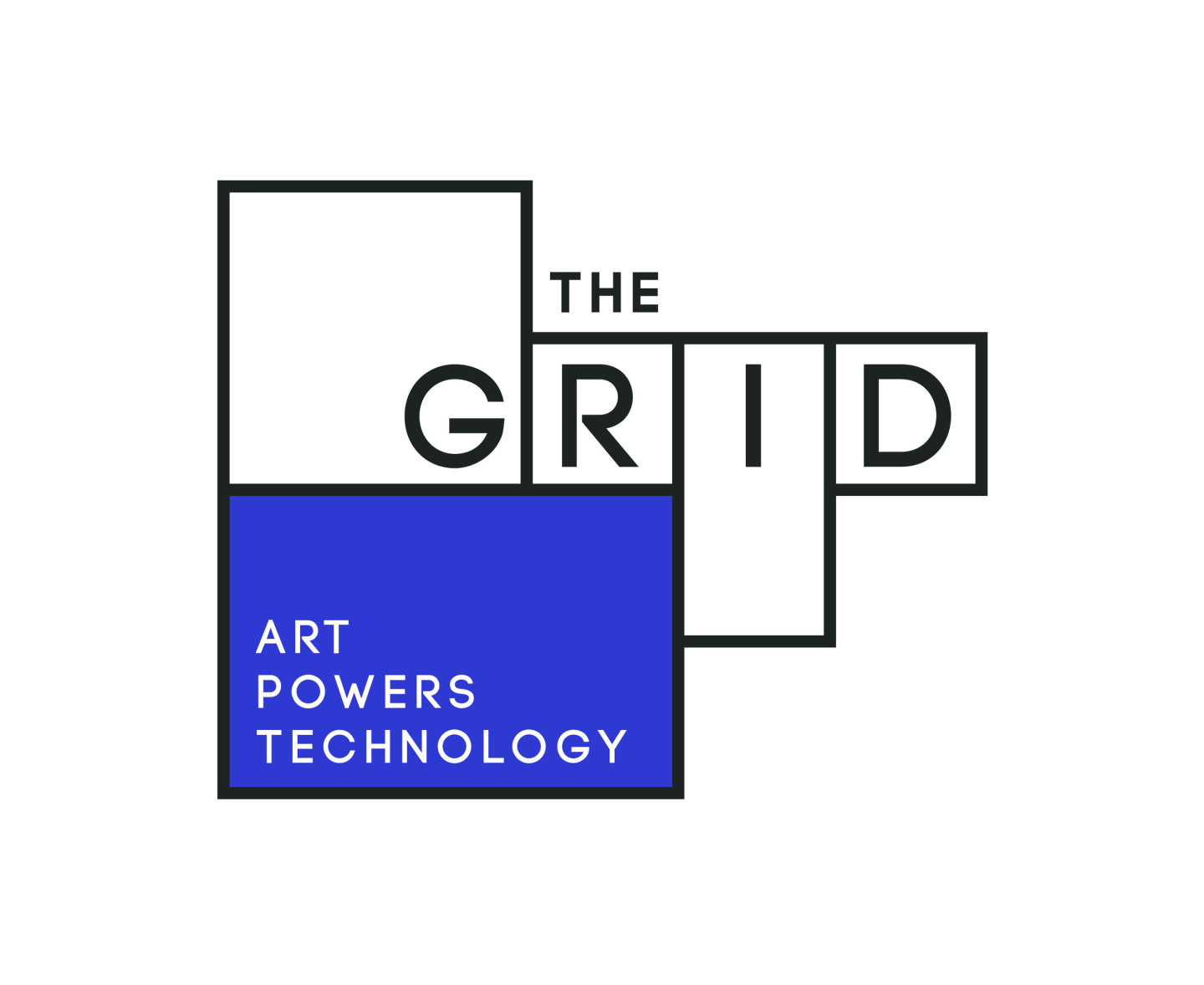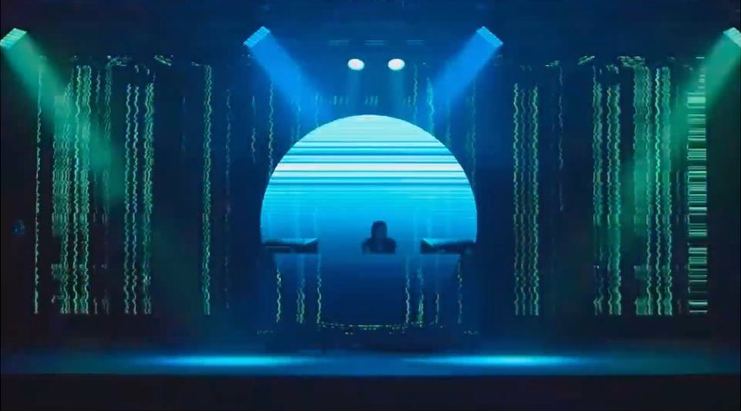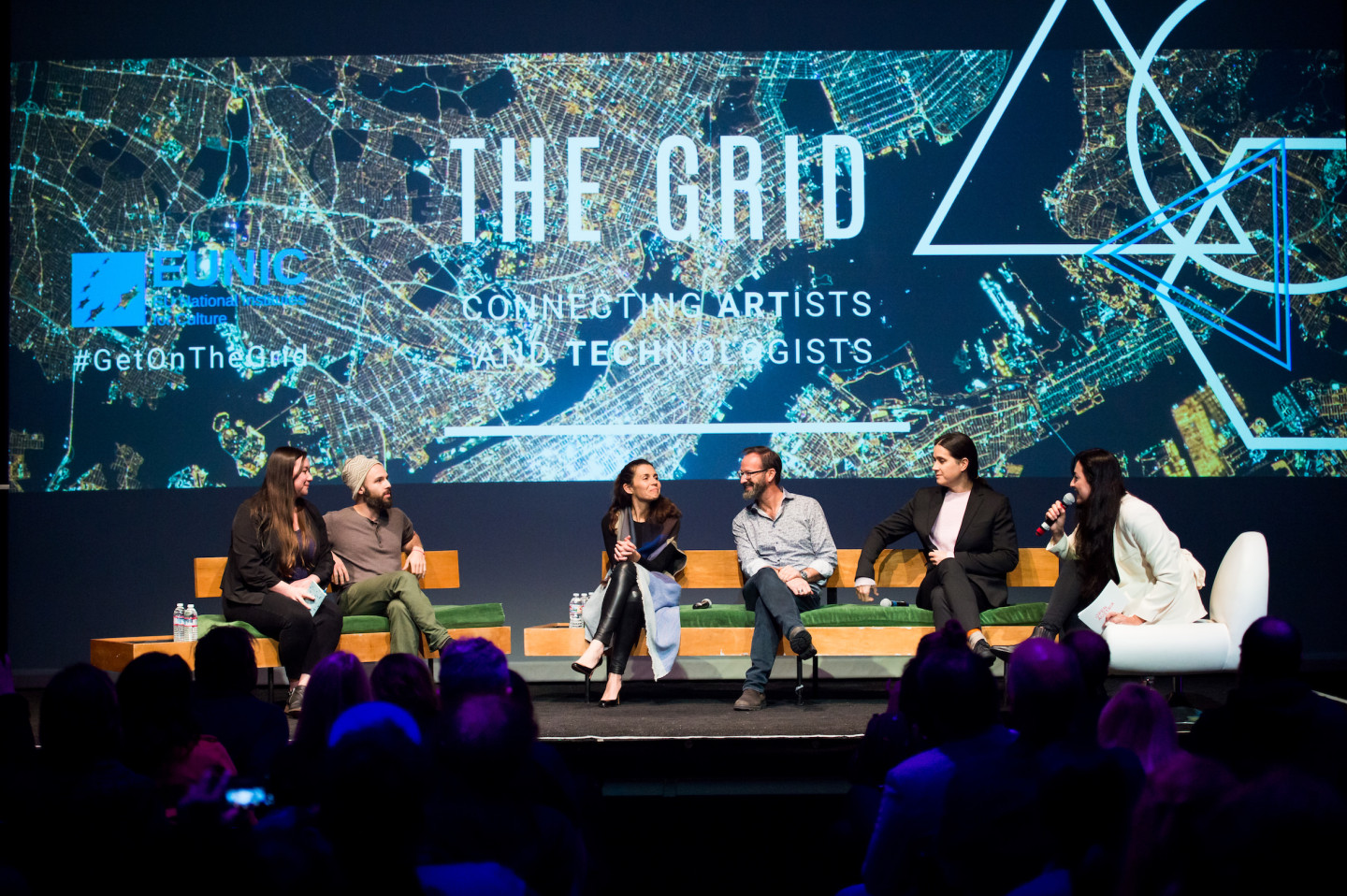The Grid is incorporating art-thinking into the development of new technologies, jump-starting a conversation between artists, technologists, and policy makers from Europe, Silicon Valley and beyond.
Technological innovation has ripple effects throughout the entire world, dominating our lives in positive, and often negative ways. Society nowadays focuses on the destructive sides of technological progress. The newly established EUNIC Silicon Valley cluster saw potential in the San Francisco Bay Area for a new avenue of EU and US collaboration, namely through the intersection of art and technology.
Initiating a pioneering experiment, placing artists within research and development teams in Silicon Valley, The Grid investigates if art-thinking can humanise technology, influence design processes, and anticipate destructive impacts, with the goal of facilitating a new collaboration model between the worlds of art and tech that could be used on a global scale. The Grid’s purpose also aimed to establish a dialogue on principles of how to best shape such a relationship.. All activities build on the findings of an investigation published in the Art + Tech Report of 2019.
This report assessed the current art and tech landscape and revealed the vital role artists could play within tech companies and the obstacles companies face when trying to incorporate artists. From these insights, the report recommended Europe to play a leading role in bridging the gap between tech companies and artists. It further recommended that EUNIC Silicon Valley, and by extension The Grid, could act in this capacity in the Bay Area.
I see a bright future for the collaborative relationships begun through the launch of The Grid.
Nodes - Art + Tech Encounters
“Nodes – Art + Tech Encounters” was a series of talks organized by The Grid that brought together artists, technologists, and researchers from the US and Europe to engage in a dialogue about the potential and necessity of interdisciplinary collaborations between the art and tech worlds. With speakers from both sides of the Atlantic, these talks dove into the complex, intertwined history between these realms. Through this series, The Grid sought to establish a productive dialogue on this relationship and to highlight the potentials of utilizing artistic thinking in tech companies.
The Grid: Exposure - Art + Tech + Policy Days
The Grid: Exposure - Art + Tech + Policy Days:: a major art + tech showcase in Silicon Valley in September 2020. Together with four main partner organizations (Gray Area, Codame, MUTEK.SF, and Zero1), the virtual festival offers different formats of content creation: workshops, panels, live performances, and community outreach, themed Blurred Borders.
Adding the policy component to the art + tech mix further strengthened The Grid’s positioning within the art, tech, and regulatory spheres and broadened its visibility and influence among policy makers and tech partners.
Exposure - Art + Tech + Policy Days stretched The Grid’s original boundaries to include policy as a third pillar, thus paving the way for a unique collaborative model that invites policymakers to pursue a more holistic approach to rules and regulations. It mobilised a dialogue with the local tech industry, and policy makers from Brussels and California on such topics as AI and creativity, reimagining tech regulation, and the creation of new digital communities around the world.
According to responses, the Exposure festival established a strong positioning of the EU/Europe as an instigator and thought leader in this intersectional field of art + tech + policy. Furthermore, the strong show of support and solidarity for the local arts organizations was seen as a powerful sign in these testing times.
Adding the policy component to the art + tech mix further strengthened The Grid’s positioning within the art, tech, and regulatory spheres and broadened its visibility and influence among policy makers and tech partners. The programme included 26 events with 100+ speakers/panelists from 12 countries, co-curated by 16 partner organizations over the course of 4 days. All panels and showcases can be rewatched on The Grid’s YouTube channel.
Art + Tech Report 2020
The Art + Tech report 2020 builds on the observations and recommendations of the Art + Tech Report 2019 by examining the historical, political, ideological and cultural forces that have shaped the encounter of art, technology, counterculture, and industry in the Bay Area.
The report finds that in the field of art and technology in the Bay Area, the tech sector’s needs, goals, priorities, and structures tend to orchestrate the dynamics of the field. It therefore proposes some strategies for The Grid to cultivate more equitable and sustainable collaborations between individuals and institutions, and in so doing, work to build trust between stakeholders with sometimes very different priorities.
eVe Award
The eVe Award honours outstanding collaborative projects at the intersection of art and technology that have successfully implemented art thinking in tech development processes. An Open Call for the award seeks to highlight looks for artistic collaborations and artworks that repurpose technologies from their intended applications and fill them with new meaning. The award seeks projects that uncover technology’s hidden strengths, point to unforeseen outcomes, and open up new perspectives, while also acknowledging its downsides and unintended consequences.
The eVe Award 2021 was awarded during the South-by-South-West conference in March 2021 to two sto-rytellers: Daniel Kehlmann, renowned German-language novelist and playwright, and Bryan McCann, a philosopher and scientist of natural language. Together, they explored the role that artificial intelligence tools called language models might play in storytelling. McCann had designed a new language model called CTRL to give users more control over the AI text generation process. Working together, Kehlmann and McCann explored a novel mode of storytelling that integrates AI as a collaborator.
SXSW Panel: “A New Digital Humanism: Art + Tech + Policy”
As another initiative to bring together art, tech, and policy, The Grid hosted a panel at South by Southwest (SXSW), a festival/conference based in Austin, Texas that celebrates the convergence of tech, film, and music industries. On March 16, 2021, The Grid’s panel, “A New Digital Humanism: Art + Tech + Policy,” premiered at SXSW and was hosted by Open Austria on behalf of The Grid. The panel discussion focused on Digital Humanism - a novel concept that aims at placing humans and citizens back at the heart of technology and, by extension, to the related policy.
#GetOnTheGrid
The project fills a virtual stakeholder map, bringing artists, technologists, cultural organisations and tech companies together. On this map, every stakeholder is visualized with a colour-coded dot, equally sized for e.g. both tech giants and individual artists. Everyone in art + tech is encouraged to #GetOnTheGrid, and to contribute to the growth of the network.
There is a value in joining The Grid because it comes in as a sort of unaffiliated third party. They [EUNIC] can play the role of hosting and moderating and connecting organisations without getting in a competitive relationship.
The Grid as European Space of Culture
The project was seen by the selection committee as considerably relevant to the global context and by extension, relevant to the local one since this particular local context is quite global. The proposal was well elaborated and the committee saw the project as an answer to a ‘silent war’ between tech and art. The committee acknowledged the need to support the artists, which Europe has a duty to support.
The committee saw potential in the strategic dialogue and partnerships the project entails, bringing together people from both worlds, helping to create a common language, and in doing so, innovative solutions to various (ethical) questions.
Model of collaboration
The model of collaboration is based on a coherent concept and strategic positioning around one thematic focus. Leadership of the project amongst the EUNIC partners ties together with the EUNIC presidency, giving a clear curational signature by EUNIC Presidency. The project is moving towards a locally registered NGO. The collaboration model has potential in the strategic dialogue and partnerships the project entails, bringing together people from both worlds, helping to create a common language, and in doing so, innovative solutions to various (ethical) questions.



